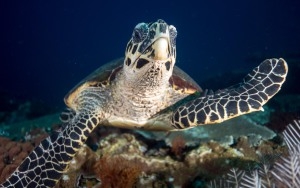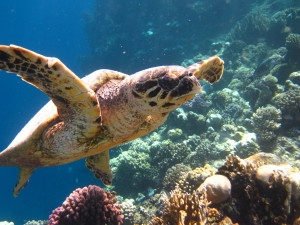Scuba diving - the next chapter
May 22, 2017
Meeting the expectations of older divers
By as early as 2020, 30 percent of the population will be at least 60 years old. This is a fact that the sport of scuba diving needs to deal with, just like any other sport. Hardly any other sport is so independent on the age of the participants this fact is something that the scuba diving industry has acknowledged.
Without doubt, Rosie is a lady who can drive men crazy. This is thanks to her curvaceous body, graceful movements, and long and slender neck.
When she strikes a pose, settles down and flirts with the camera, the wrinkles on her long and slender neck can be seen after all, she is no longer one of the youngest.
Unfortunately, she has not disclosed her true age yet, said Georg Miesbach in German. Ever since the first time I came to Bali, she has been here – and that was more than twenty years ago.
Indeed, Rosie the turtle and Miesbach from Middle Franconia in Germany have much in common: They both belong to the age group which advertising strategists refer to as the Best Age, and they both feel equally at home underwater.
Such is the situation that more and more people find themselves in. As demographics evolve, the guests at dive centres also evolve the average age of their clients continue to rise.
Describing diving as an ageless sport, Miesbach said, the focus lies not in speed, but the other elements. In addition, there is the feeling of hovering, the ease of just being. I enjoyed diving in my youth, and
I still do."
Some things have changed. In the past, he was inspired by the hunt for big fish and the fight against the current. These days, he prefers the little things: searching for pygmy seahorses usually unseen by the untrained eye, finding three different species of anemone fish gathered around an anemone, catching a glimpse of a ghost pipefish that to Miesbach embodies the concept of beauty.
Since he was young, he has explored much of the reefs, always with an eye out for spectacular encounters. Today, he dives at a mire leisurely pace, with an appreciation for the smaller animals. In doing so, he spots much more of the animals now, compared to his younger days.
Dive centres, training organisations and equipment manufacturers are getting better in serving the needs and expectations of their older clients. Even if a diver has stopped diving for some time, it is possible and simple enough to sign up for a refresher course.
On a refresher course, a diver would be accompanied by an experienced guide or dive instructor, but the diver would already be familiar with most of the hand movements and gestures. It is similar to riding a bike. After a long break, the first time out is somewhat wobbly, but you never forget what you have learnt, said Markus Kropp, a dive instructor in Egypt.
More and more older divers are returning to the sport. "In such cases, certain things are required, which are not as relevant when we deal with young people", said Dieter Merz, Manager of Werner Lau dive centres in Bali. "Things
like flexibility, patience and personal attention, for example, as well as a simple entry into the water at a sandy beach something we have right here at our doorstep."
However, there is limited information about diving for older people. Even those in their eighties can indulge in this sport as long as they are in good health.
Nevertheless, it is necessary to do a health check once every two years, then once a year after the age of forty.
This is something that Miesbach is familiar with. His first dive was in 1977, when he was 30 years old. After that, he has spent more time underwater than on land, and there were years in which he had gone on as many as three diving holidays. In his logbook, he has recorded 3,700 dives, travelling as far as the Caribbean and Papua New Guinea.
"I owe a lot to diving, he said. Great trips, fascinating experiences and personal friends I won’t want to miss out on these anymore. I will be faithful to this hobby for as long as I can."



